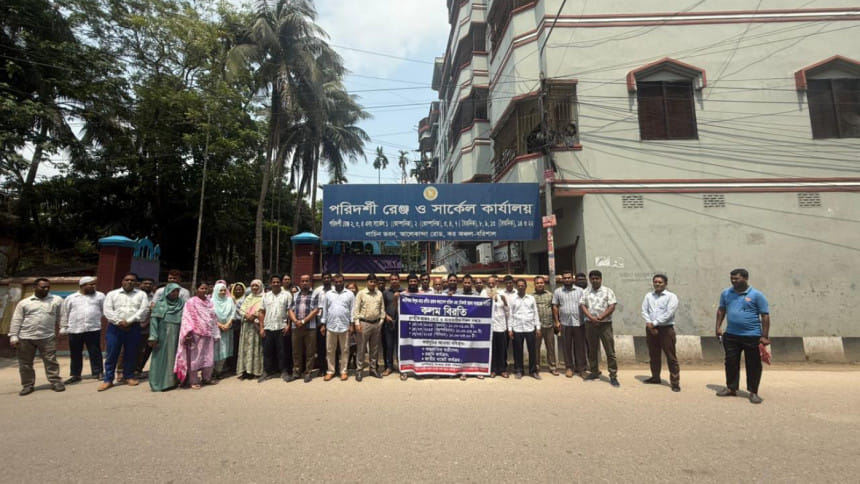Strikes to go on unless CA intervenes

Employees of the National Board of Revenue (NBR) yesterday vowed to continue their pen-down strike against a May 12 ordinance on restructuring the revenue administration, unless Chief Adviser (CA) Prof Muhammad Yunus or a representative proposes a mediation.
"We have learned through the media that the finance adviser (Salehuddin Ahmed) will sit for a discussion with the NBR officials on Tuesday," said Sehela Siddiqua, additional commissioner of the NBR.
"But we are yet to receive any formal or specific proposal. If we get any formal proposal from the CA or his representatives, we will send a team for the discussion. Without the CA's concern, we won't sit for discussion," she added.
"Based on the circumstances, our strike will continue tomorrow (Monday) in the same manner, from 9:00am to 3:00pm," she said.
Siddiqua made the announcement at a press briefing at the NBR headquarters in Agargaon to press home their three-point demand, including the repeal of the ordinance.
Revenue activities for import and export have been disrupted nationwide, posing a serious risk to overall revenue collection and business operations
The other demands are for the public disclosure of a state advisory committee's report on reforms required for the NBR, which was submitted to the finance ministry, and inclusive, consultative, and sustainable reforms for the revenue administration.
Yesterday, the strike was observed for the fourth consecutive day, led by the "NBR Reform Unity Council", a platform of cadre and non-cadre officials.
Meanwhile, revenue activities — including import and export — have been disrupted nationwide, posing a serious risk to overall revenue collection and causing significant setbacks for regular business operations.
Business leaders warn that if the situation persists, it could lead to delays in the release of imported raw materials, shortages of essential goods, and disruptions to industrial production.
According to sources in the NBR, officials at 25 customs stations — including the Chattogram and Mongla ports and Kamalapur Inland Container Depot — and over 100 VAT, customs, and tax offices nationwide were observing the strike.
While export consignments are still being processed, importers say they have been unable to avail their goods, affecting exports that rely on imported raw materials.
Shawkat Osman, owner of Silver Steel Company, said his imports arrived at the Chattogram port in eight containers on May 14 but he has been unable to receive them.
"Customs officials usually work from 9:00am to 8:00pm, but now they are leaving by 5:00pm," he said.
"With only two active hours from 3:00pm to 5:00pm, I couldn't get physical inspections conducted. Without it, I can't clear customs or pay duties to release my goods," he said.
Osman also noted that his container demurrage and port charges amounted to around Tk 1.5 lakh per day.
Several clearing and forwarding agents echoed similar concerns, stating that while exports were technically exempt from the strike, the slowdown was affecting outbound shipments as well.
The inability to take away imported raw materials is already having a knock-on effect on export orders.
Mohammad Saidul Islam, deputy commissioner of Chattogram Custom House, said directives have been issued to ensure that no file remains stuck at any desk after the work abstention hours.
"Officials have been instructed to process and release files before leaving office, even if it means staying back after 5:00pm," he said.
He also claimed that export operations and airport services have remained functional during the protest, and his office has not received any official complaint regarding the issue.
However, with 78 percent of the country's imports and 84 percent of the country's exports passing through the Chattogram port, any disruption in import clearance has a ripple effect across the entire economy, business leaders warned.
According to data from Chattogram Custom House, the average number of import consignment assessments and inspections per day has dropped by half over the past four days — from around 4,000 to approximately 2,000.
Without assessment and inspection, importers are unable to receive their goods.
According to customs data of May 13, some 3,460 import bills of entry were processed, whereas the number fell to 1,874 the next day — the first day of the strike.
The number stood at 1,897 on May 15 and 1,895 on May 17.
Yesterday, customs activities remained suspended until 3:00pm due to the ongoing strike, officials said.
The number of containers at the yards increased by 1,000 TEUs (twenty-foot equivalent units) during the same period, rising from 40,708 TEUs on May 15 to 41,695 TEUs on May 18.

 For all latest news, follow The Daily Star's Google News channel.
For all latest news, follow The Daily Star's Google News channel. 



Comments